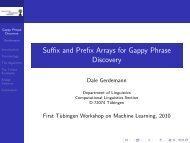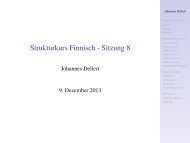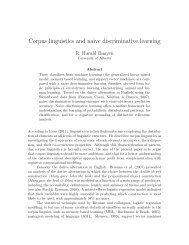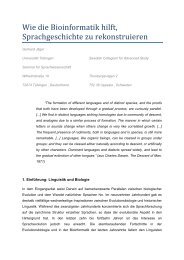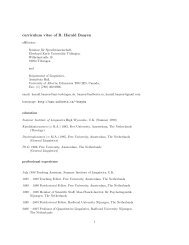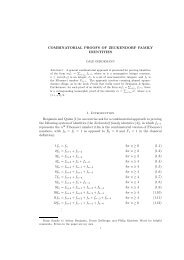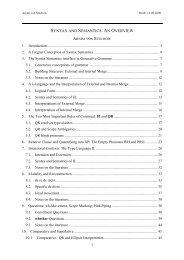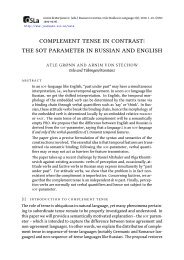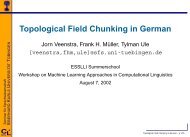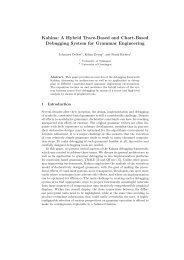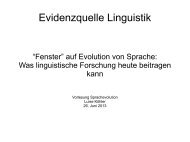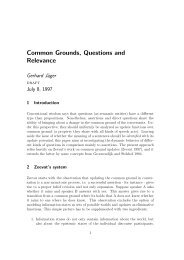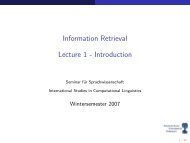A Treebank-based Investigation of IPP-triggering Verbs in Dutch
A Treebank-based Investigation of IPP-triggering Verbs in Dutch
A Treebank-based Investigation of IPP-triggering Verbs in Dutch
Create successful ePaper yourself
Turn your PDF publications into a flip-book with our unique Google optimized e-Paper software.
ton and Stacklazy), we tra<strong>in</strong>ed a model on the available epic poems <strong>of</strong> Homer and<br />
we used it to parse the whole work <strong>of</strong> the epic poet Hesiod, a sample <strong>of</strong> roughly<br />
equivalent size taken from the tragedies <strong>of</strong> Sophocles and the only philosophic<br />
dialogue <strong>of</strong> Plato that is <strong>in</strong>cluded <strong>in</strong> the AGDT. The results are reported <strong>in</strong> table 9.<br />
Cov<br />
Stack<br />
Test set LAS UAS LA LAS UAS LA<br />
Hesiod 60.7 69.3 72 60.9 68.8 73.7<br />
Sophocles 48.48 58.72 61.3 46.84 56 61.24<br />
Plato 47.1 60.7 60.1 48.2 60.2 62.9<br />
Table 9: Different authors with models tra<strong>in</strong>ed on Homer<br />
Hesiod’s text, the one which is closer to the language <strong>of</strong> the poems used <strong>in</strong><br />
the tra<strong>in</strong><strong>in</strong>g set both chronologically and for genre, performs far better than the<br />
two others. Plato’s set is considerably smaller, but it seems that a prose text like a<br />
philosophical dialogue is more difficult to parse for a parser tra<strong>in</strong>ed on epic poetry<br />
than a complex poetic text like the one <strong>of</strong> Sophocles. This result confirms the<br />
well known fact that the Homeric poems are a fundamental model and a source <strong>of</strong><br />
<strong>in</strong>spiration for the language <strong>of</strong> Greek poetry. Further studies will be required as<br />
soon as new prose texts are added to the collection, <strong>in</strong> order to confirm this result.<br />
3 Conclusion and future work<br />
We have focused on the performances <strong>of</strong> a probabilistic dependency parser (Malt-<br />
Parser) on Ancient Greek literary texts. By tun<strong>in</strong>g a series <strong>of</strong> features, we have<br />
considerably improved the efficiency <strong>of</strong> the parser.<br />
In the process, we have used MaltOptimizer and further improved the feature<br />
model suggested by the s<strong>of</strong>tware, by us<strong>in</strong>g the lemmata <strong>of</strong> the words (<strong>in</strong> addition<br />
to forms) and <strong>in</strong>troduc<strong>in</strong>g other modifications that are resumed <strong>in</strong> tab. 11 and 12.<br />
From our experiments, it emerged that, <strong>in</strong> order to parse a given Ancient Greek<br />
literary work, texts that belong to the same genre as the target text should be used<br />
as a tra<strong>in</strong><strong>in</strong>g set, rather than the totality <strong>of</strong> the available collection. This is proved<br />
<strong>in</strong> the case <strong>of</strong> Sophocles, whose work is not yet fully annotated. Our results can<br />
help <strong>in</strong> provid<strong>in</strong>g a more accurate and reliable basis for semi-automatic annotation<br />
<strong>of</strong> the rema<strong>in</strong><strong>in</strong>g texts <strong>of</strong> this author and, arguably, for Euripides’ work as well.<br />
In the future, we will test other parsers, <strong>in</strong> order to compare their performances<br />
and see whether we can further improve our prelim<strong>in</strong>ary results. In particular, we<br />
<strong>in</strong>tend to test: DeSR, ISBN, MST, Anna (Mate-Tools) 15 . We will also <strong>in</strong>clude<br />
15 DeSR: https://sites.google.com/site/desrparser/; ISBN: http://cui.unige.ch/<br />
~titov/idp/; MST: http://www.seas.upenn.edu/~strctlrn/MSTParser/MSTParser.html;<br />
Anna: http://code.google.com/p/mate-tools/.<br />
141



